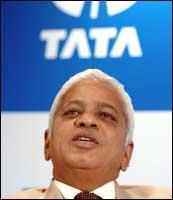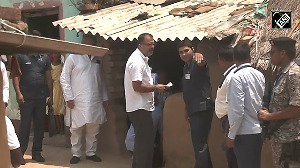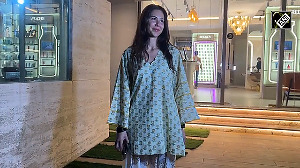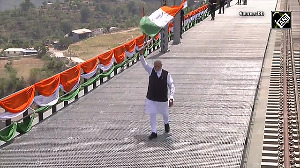 B Muthuraman, Chief Executive Officer of Tata Steel, is all fired up -- about his company, about his job, about his industry, and about Jameshedpur, the township in Jharkhand where Tata Steel is based.
B Muthuraman, Chief Executive Officer of Tata Steel, is all fired up -- about his company, about his job, about his industry, and about Jameshedpur, the township in Jharkhand where Tata Steel is based.
Like most Tata CEOs before him, Muthuraman lives and breathes his business, and ascribes to the paternalistic philosophy of making a difference not just to shareholders but to the community as well.
Very little disturbs the calm Brahmin from south India -- except talk that manufacturing is somehow a lesser endeavor than information technology. He's clearly a factory man. Muthuraman is also erudite and can quote liberally from the Western classics as well as the Hindu scriptures.
He often dashes off -- in longhand, later scanned on to the computer and then dispatched -- six- to seven-page missives to his top lieutenants detailing what he has observed during his travels or offering his musings on what the company needs to do going forward.
Muthuraman recently spoke with BusinessWeek's Mumbai Bureau Chief Manjeet Kripalani. Edited excerpts of their conversation follow:
Steel seems such an old-fashioned business, yet you use information technology intensively in your company.
Yes, Tata is the largest user of IT in India. We have 5,000 IT licenses, and spent $115 million on IT over the past decade. We have 350 IT engineers in our company. We've even won local and regional awards for being the best users of IT in the country -- and our competition was tech companies.
How do you build on your manufacturing knowledge base within Tata Steel?
IT is a great enabler for wealth creation, but it isn't a wealth creator. I get angry with the description of IT being knowledge-based -- as if manufacturing is not based on knowledge.
We have a lot of free exchange of knowledge in the company. It's 80% of the job. The other 20% is deploying IT to spread [the knowledge].
Every two weeks, in a big hall in our plant in Jamshedpur, we have a knowledge marathon. About 100 workers gather at 10 tables and for three hours discuss different subjects. Like welding, for example.
We'll have an executive who may initiate the discussion, and the workers speak up about their experience, share practical knowledge, and then implement it.
I understand you write letters to communicate with your staff.
I write a personal diary every week, and have been for 15 years. I write six-page memos or notes to my colleagues. For instance, if I go overseas and I visit a plant or meet someone interesting or new, I write it out.
I scan in my written pages and send it out to 20 to 100 people, depending on what the topic is. When one writes, one's thoughts become very clear.
What are your ambitions for Tata Steel?
We're aiming to be a 20 million-ton company by 2010 and 35 million-ton company by 2015. We currently make 7 tons of steel a year, and this includes Singapore's NatSteel and its China plant.
By [2015], we'll be among the top five steel companies in the world in size. We'll build through greenfield ventures, and by acquisition.
India is a good place to make and consume steel, China is a good place to consume but not make steel. So we will make steel where raw material is available, and finish it in places where the market exists.
We're looking at the finishing markets of South East Asia, and putting up greenfield plants in India -- in Jharkhand, in Chhattisgarh, and Orissa. We will also go to other geographic regions in the world.
Tata Steel has a deep social commitment. Can you expand on this?
Tata Steel isn't just a company that has input and output. There is a purpose to an industrial organization, and its job is not just profit but also how it improves society. It needs to give TRS -- total returns to society.
How is that measured? By what you do for your workers, your customers, the government, for the environment. Judge companies on this basis.
Jamshedpur [a private township run by Tata Steel] is the cleanest city in India. You can drink water from the tap, just like in the US. You can do this nowhere else in India.
We're part of the Global Compact, a concept of global corporate social responsibility put forward by the UN. There's a Global Reporting Initiative that makes you report not just on finance and being world-class in products and services but on social and environmental measures. We submit an annual report to the UN on this every year.
We were only 1 of the 12 companies in the world among the founder members.
What are the hurdles you face along your growth path?
The biggest is human resource and leadership. A company that has grown at a leisurely pace is suddenly speeding up.
Don't Miss: India: An Agent Of Change






